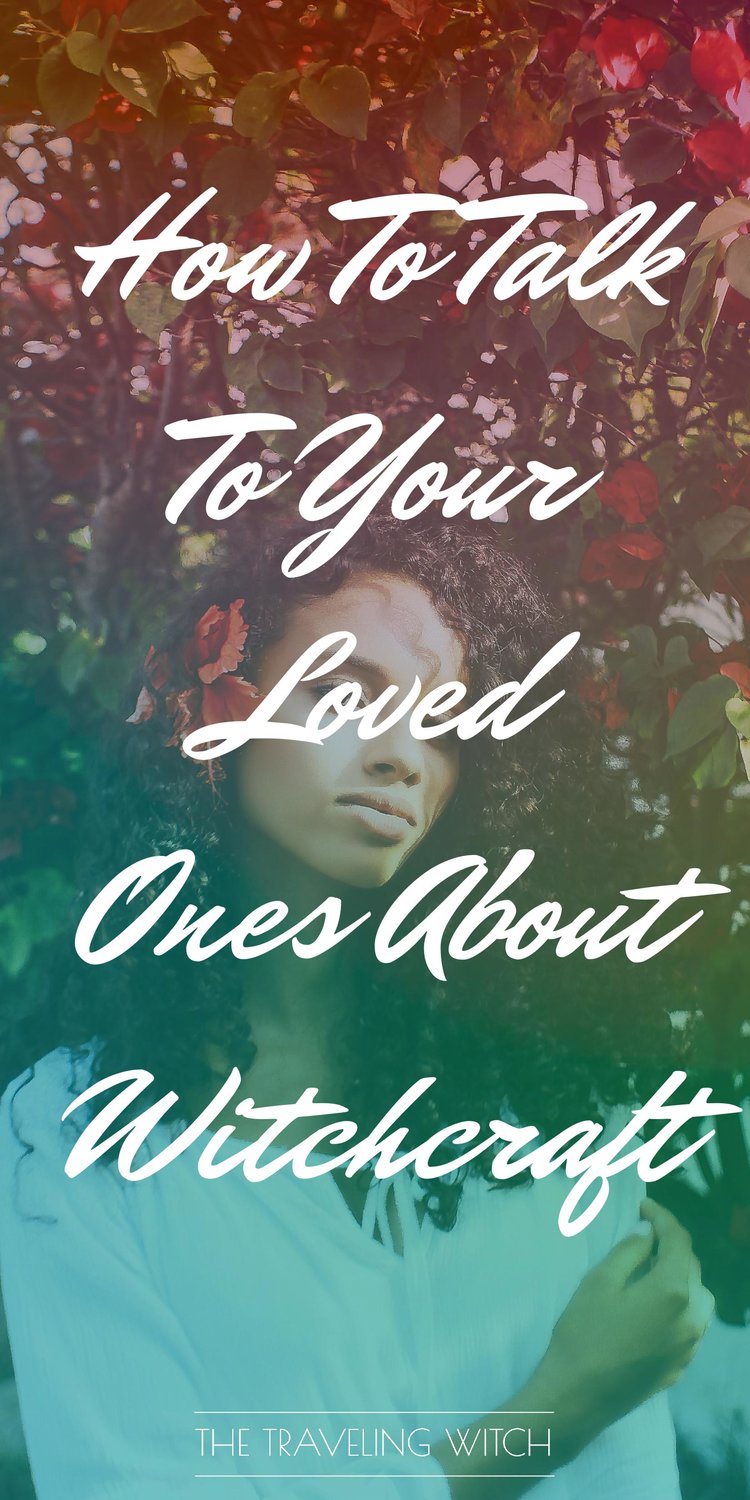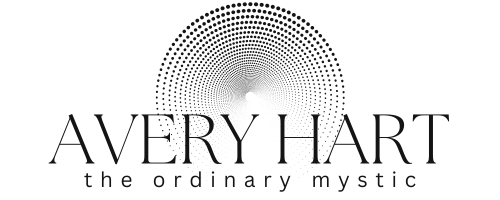The words “witch” and “witchcraft” mean different things to different people. If you’re a witch, you might associate those words with power, self-love, and magic.
If you say those words to someone who isn’t at all familiar with the practice of witchcraft, he or she might immediately think of the stereotypical witches from horror movies or the famous witchy poem from Shakespeare’s Macbeth, “Double, double, toil and trouble…”

Because of these flawed notions of witchcraft, a lot of witches tend to keep their magic secret.
There’s nothing wrong with keeping your witchcraft to yourself. It’s your personal practice, and it’s really no one’s business but your own. That being said, if you want to talk to your non-witchy loved ones about being a witch, here are six tips to help you with this potentially delicate conversation.
Tip #1: Speak their language
Words are powerful, but that’s only if the words are understood by both parties in a conversation. Your non-witchy loved ones will likely have no clue what Samhain is or what you do with an athame. When you talk about your witchcraft, use words they’re familiar with like “meditation”, “spiritual practice”, or “ritual”.
If you suspect your loved ones are going to be a bit weirded out by words like “spells”, “witchcraft”, and “magic”, you can choose to avoid those altogether and focus on the more mainstream practices of magic like journaling and gardening, rather than overtly witchy activities like potion-making and directing energy with wands.
Tip #2: Show, don’t tell
You don’t even have to initiate a conversation about your witchcraft if you don’t want to. Instead, wait for someone to comment on the pentagram necklace you started wearing or the bay leaf in your wallet. When this happens, simply answer each question clearly, lovingly and authentically. For example: “I wear this necklace because this pentagram symbol represents protection.” or “I’m just using this bay leaf to call in some financial abundance.” Try not to get nervous or defensive when you do this.
When you answer questions as they come up, you are able to balance publicly embracing your witchiness while also letting your loved ones decide if or when they want to ask about your practice. Maybe the bay leaf thing freaks them out, and they never ask you about any of your magical practices again. Conversely, they might be intrigued and ask you more.
Whatever their response, just keep being authentic. Trust your intuition and trust that the people in your life who ask about your witchcraft will respond with love.
If any questions make you uncomfortable or your loved one’s reaction is negative, you can respectfully (but firmly) end the conversation or change the topic. This will give you a lot of practice setting personal boundaries for yourself which is a great self-care habit to cultivate.
Tip #3: Talk about the mainstream aspects of your witchcraft
Science & Witchcraft
People are making some fascinating discoveries in the field of quantum mechanics. By studying the behavior of electrons and other sub-atomic particles, scientists are finding evidence that suggests manifesting and magic are possible. I know that YOU know it’s not only possible, it’s a cornerstone of your witchy practice. But explaining your beliefs through the objective lens of science can help your loved ones understand a little easier. Science makes sense to most people whereas magic is a foreign concept.
A great book that explains the concept of manifesting using data about brain waves and quantum mechanics is Breaking the Habit of Being Yourself by Dr. Joe Dipenza. If you haven’t read it yet, check it out. It might be the perfect tool you’re looking for to bridge the gap between your beliefs and the beliefs of your loved ones.
Personal Development & Witchcraft
This was the path I took into witchcraft, and it felt so natural because there is a huge amount of crossover between the two schools of thought. Some common personal development techniques like saying affirmations, meditating, and the principles of the Law of Attraction are also practiced in some branches of witchcraft—in the exact same way.
You are a Badass by Jen Sincero and Big Magic by Elizabeth Gilbert are wonderful mainstream personal development books that cover witchy topics without ever using the term “witchcraft”.
Business Practices & Witchcraft
There are many business books that describe some very witchy practices, even though you’d never know it if you weren’t a witch yourself.
One of these practices is called “visualization”, a form of meditation where you imagine in your mind’s eye what you want to achieve or get good at. You’ve probably done this a time or two in front of your altar. And guess what? Lots of other successful salespeople, CEOs, and athletes use this same technique to increase their chances of performing well in their high-pressure moments.
Another idea that shows up in business books is the practice of goal-setting. In witchcraft, we often refer to it as “intention-setting”. It’s basically the same exact thing.
Books that cover these topics are The Psychology of Selling by Brian Tracy, and Talent is Overrated by Geoff Colvin.
Tip #4: Keep the communication going both ways
When you tell your loved ones that you’re a witch, they might go completely silent and just stare at you. If this happens, try to keep the conversation going. Ask if they have any questions. Because there are so many misconceptions about what it means to be a witch, you can use this as an opportunity to dispel some of these myths. Ask what they think of when you say you’re a witch. Ask if they have any fears about your witchcraft. If they’re religious, explain how witchcraft can be paired with any religious, and ask if they have any questions about that. Just keep the conversation going as long as it feels good to you.
Tip # 5: Detach from the outcome
It’s so hard to give up control sometimes, and there are a lot of things out of your control when you decide to talk about your witchcraft with your non-witchy loved ones.
The way to make this easier on yourself is to detach from the outcome. Don’t sit around for hours worrying about what they’ll say. Don’t plan the conversation line by line. Don’t try to guess how your loved ones will react.
Be brave, be loving, and trust that the right words will come to you when you need them.
If your loved ones don’t take it so well, that’s ok. Congratulate yourself for being vulnerable and being willing to share a part of yourself with the people you love.
By doing this, you are giving them the honor of seeing all of you, so that they can choose to love all of you.
If you sense any kind of rejection from them when you’re having this conversation, remind yourself that the rejection is coming from that person’s own limiting beliefs and emotional wounding. Their rejection is not your rejection. Their shame, anger, or fear is not yours to hold onto. Focus on holding energetic space for your loved ones during this conversation while still maintaining your own personal boundaries.
Tip #6: Cultivate an attitude of compassion for yourself
You might intend to have a calm, respectful, productive conversation about witchcraft with your non-witchy loved ones, but things don’t always go as you planned. Emotions are powerful things, and when you’re being vulnerable with the most important people in your life, you might lose your cool a few times.
If the conversation gets a little heated, take a moment to breathe, and try again. Be compassionate with yourself. Forgive yourself. Don’t beat yourself up for saying the wrong thing, or getting upset. That stuff can be part of healthy communication as well. Remind yourself, that you’re doing the best you can, and guide your mind back to the love you have for these people.
Honor Yourself If You Don’t Want To Tell Anyone
No one ever said you had to shout it from the rooftops that you’re a witch. You can go right on practicing without a single person in your life knowing it. As a witch, you are free to be secretive or free to share with the world.
All witches have a different group of family and friends surrounding them. For some witches, letting their loved ones in on their practice would cause more harm than good. Other witches might worry about judgment from co-workers, neighbors, or friends. If you’re reading this and thinking, “there’s no way I would ever let my aunt find out about my magic”, honor that thought.
There is nothing wrong with that. There’s absolutely no need to force yourself into telling people. You’re not a “better” witch if you tell people. You’re not more spiritual or more powerful because of your decision one way or the other.
This is simply a personal choice that you can make. Your intuition will always have the answer. Trust that. It will never lead you wrong.
New to witchcraft?
Sign up for my FREE Witchcraft class!





I like that you said that witchcraft is a personal practice that uses spiritual and meditational practices. A couple of weeks ago, my sister told me that she wanted to pursue her career being a witchcraft teacher for her meditation and life practices, and she asked if I had any idea what could be the best options to consider. Thanks to this instructive article, I’ll be sure to tell her that she can consult a well-known school of witchcraft as they can help provide more information about the process of being a teacher.